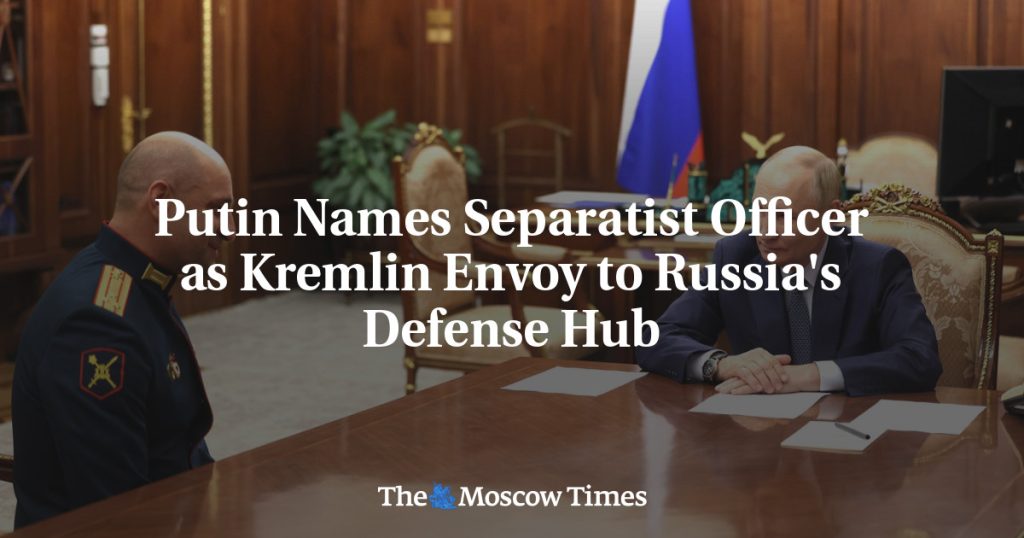President Vladimir Putin has appointed Lieutenant Colonel Artyom Zhoga, a military officer from occupied eastern Ukraine, as his envoy to Russia’s Urals region. Zhoga, who chairs the Russian-installed parliament of Ukraine’s Donetsk region, became known for asking Putin to stand for re-election in a choreographed exchange where Putin agreed to seek a fifth term. At the age of 49, Zhoga is the father of a pro-Moscow separatist battalion commander who was killed in the early days of Russia’s full-scale invasion of eastern Ukraine.
Following a meeting with Putin, Zhoga was offered the position of presidential envoy in Russia’s Urals Federal District, which is known for its industrial strength and large number of defense industry enterprises. Zhoga’s appointment was formalized through a presidential decree naming him as the new Presidential Plenipotentiary Envoy to the Urals Federal District, replacing Vladimir Yakushev who was also dismissed from the Russian Security Council in the previous month. Presidential envoys play a crucial role in liaising between the Kremlin and Russia’s regions, ensuring compliance with federal laws and overseeing the work of federal agencies.
Zhoga’s appointment as a presidential envoy marks him as one of the highest-profile Kremlin appointees to graduate from the “Time of Heroes” professional training program. This program was established by Putin with the goal of positioning Ukraine war veterans as Russia’s “new elite.” Zhoga’s background as a military officer from eastern Ukraine and his involvement in the conflict make him a significant figure in this new cohort of individuals who are being groomed by the Kremlin to play key roles within the Russian establishment.
The Kremlin’s strategy of appointing Ukraine war veterans like Zhoga to prominent positions is seen as a deliberate effort to paint these individuals as Russia’s new elites. By showcasing individuals like Zhoga, who have direct experience in the conflict with Ukraine and have demonstrated loyalty to Putin, the Kremlin aims to bolster its image and reinforce the narrative of Russia as a strong and resilient power. These appointments also serve the dual purpose of integrating individuals with first-hand experience of the conflict into positions of power, enabling the Kremlin to potentially leverage their insights and expertise in future decision-making processes.
The appointment of Zhoga as a presidential envoy to the Urals Federal District highlights the Kremlin’s emphasis on consolidating power and influence in key regions of Russia. Given the Urals region’s significance as an industrial hub with a strong defense industry presence, Zhoga’s background as a military officer and his connections to the conflict in eastern Ukraine may be leveraged to advance Russia’s strategic interests in the region. The appointment also underscores the Kremlin’s broader strategy of promoting individuals with relevant experience and loyalty to Putin to positions of authority, thereby strengthening the Kremlin’s control over various sectors of society.
Overall, the appointment of Artyom Zhoga as a presidential envoy to Russia’s Urals region reflects the Kremlin’s strategic goals of consolidating power, projecting strength, and grooming a new generation of loyal elites. By tapping into the expertise and loyalty of individuals like Zhoga, who have direct experience in the conflict with Ukraine, the Kremlin seeks to reinforce its narrative of resilience and dominance while also solidifying its control over key regions and industries within Russia. As part of Putin’s broader vision of positioning Ukraine war veterans as Russia’s new elite, figures like Zhoga are likely to play a crucial role in shaping the country’s future trajectory under Putin’s leadership.


